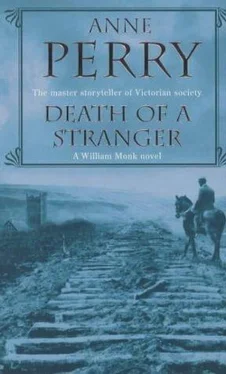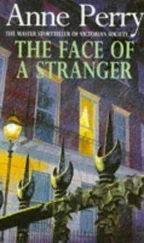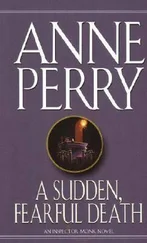Monk steeled himself to ask the question he dreaded. “What about accidents, crashes?”
“God knows how many men get killed in the construction.” Wedgewood pursed his lips, a flicker of anger and sadness in his eyes. “But I never heard of one that was down to poor building.”
“Substandard materials?” Monk asked.
Wedgewood shook his head. “They know their materials, Monk. No navvy is going to put in the wrong stone or wood, or anything else. They know what they’re doing. They have to. Don’t shore up a wall properly, or put in insufficient timber, and the whole lot will come down on top of you. It’s my business to know, and I’ve never heard an instance of navvies getting it wrong.”
“But there have been accidents!” Monk insisted. “Crashes, people killed!”
Wedgewood’s eyes widened. “Of course there have, God help us. Terrible ones. But they were nothing to do with the track.”
“What then?” Monk found himself holding his breath, not for Katrina Harcus but for himself. It was Arrol Dundas who filled his mind, and his own guilt in whatever had happened seventeen years ago.
“All sorts of things.” Wedgewood was looking at him curiously. “Driver error, overloaded wagons, bad brakes, signals wrong.” He leaned forward a little. “What are you after, Monk? If someone wants to invest in Baltimore and Sons all they have to do is ask in the financial community anywhere. They don’t need a private agent of enquiry for that. Any merchant banker would do.”
“I have a nervous client,” Monk admitted. “What about unsuitable land?”
“No such thing,” Wedgewood replied instantly. “Good navvies can build on anything, and they do. Sand. Swamps, even-it just costs more. They need to lay pontoons, or sink stilts until they come to bedrock. Are you sure you aren’t after his personal life?”
Monk smiled. “Yes, I am sure. The Baltimore family is not my client, nor is anyone related to them. I have no concern in his death unless it has to do with his railway’s honesty or safety.”
“I doubt it has,” Wedgewood said ruefully. “Just a very regrettable lapse of personal judgment.”
Monk thanked him and left to pursue the other idea nagging more and more insistently in his mind. Perhaps no one would risk a fraud in which one sharp-eyed navvy might betray him. And the amounts of profit he made might be small. Far easier and less dangerous, and certainly with more money to be made from it, would be something to do with the purchase of the land for the track.
He did not mention this to Hester. It was far more real, closer to him and not to be laid so easily at some anonymous door, although he had no memory he could pin down. There was nothing but a nameless anxiety, something dark at the back of his mind.
The following day he started specific enquiries. Who decided where a railway line should run? What provisions were there for obtaining the land? Where did the money come from? Who surveyed it? Who bought it?
It was not until he had answered these questions, all ending back with the railway company, that it crossed his mind to wonder what happened to the dispossessed who had once lived in the houses knocked down to make room for progress, or to those who had worked the land now divided or gouged out for cuttings?
None of the answers surprised him, as if he had once known them as easily as did the small, neat clerk who sat across the office table from him. The clerk looked slightly baffled at the question.
“They move to live somewhere else, sir. They can hardly stay there!”
“Do they all agree to that?”
“No sir, not quietly,” the clerk acceded. “An’ sometimes if it’s a big estate-aristocracy, or the like-then the railway just ’as ter go ’round it. No choice. ’Em as ’as got the power, in Parliament or that, can see their land don’t get cut up. An’ o’ course there’s gentry what object like mad to their ’unting being sliced in ’alf.”
“Grouse and pheasants?” Monk asked with slight surprise. He had imagined farmland.
“Foxes, actually,” the clerk corrected him. “Likes ter ride after ’em, an’ can’t get ’orses ter jump tracks like they do ’edges, an’ all.” The light in his eyes betrayed a certain satisfaction in this, but he did not elaborate. He had long ago learned not to have personal opinions, as far as anyone else would know.
“I see,” Monk acknowledged.
“Yer bin abroad, sir?”
“Why?”
“I was jus’ wonderin’ ’ow yer missed knowin’ all this kind o’ thing. Lot o’ fuss about it in the papers, goin’ back a bit, like. Protests, an’ all. Work o’ the devil… railways. If the good Lord’ad meant us ter travel that way, an’ at that speed, ’E’d ’ave made us with steel skins an’ wheels on our feet.”
“And if He hadn’t meant us to think, He wouldn’t have given us brains,” Monk countered immediately, and even as the words were on his tongue, he heard an echo of them as if he had said them before.
“Yer try tellin’ that to some o’ them ministers ’oo’s churches get knocked down an’ moved!” The clerk’s face was eloquent of his awe, and an amusement he was trying hard to suppress.
“Knocked down and moved?” Monk repeated the words as if they were incredible, but he believed them-in fact, he knew they were true. Again memory had jabbed at him and then disappeared. For an instant he saw a lean face, dark with outrage, above a clerical collar. Then it was gone. “Yes, of course,” he said quickly. He did not want the man to tell him more about it. The memory was unpleasant, touched with guilt.
“O’ course they protest.” The clerk shrugged his shoulders. “All kinds of ’em out by the score. Talk about Mammon an’ the devil, an’ ruin of the land, an’ so on.” He scratched his head. “ ’Ave ter say I wouldn’t take kindly if it were me mam an’ dad ’oo’s gravestones were took up, an’ they was left ter lie under the tracks o’ the five forty-five from Paddington, or whatever. I reckon I’d be out there wi’ placards in me ’and an’ threatenin’ ’ellfire on the profiteers as did it.”
“Has anybody ever done more than threaten?” Monk had to ask. If he did not, the question would remain in his mind, written across everything else until he found the answer. “Anyone ever sabotage a line?”
The clerk’s eyebrows rose almost halfway up his forehead. “Yer mean blow up a train? Gawd! I ’ope not!” He bit his lip. “Come ter think on it, though, there’ve bin a few nasty crashes, one or two of ’em nobody knows for sure ’ow they ’appened. Usually blame the driver or the brakeman. There was a real bad one up Liverpool way about sixteen years ago, an’ that was one as’ad a church removed, an’ the vicar was right cut up about it.” He stared at Monk with increasing horror. “Terrible one, that was. I was still livin’ at ’ome, an’ I can remember me dad comin’ inter the parlor, ’is face white as the tablecloth, an’ no newspaper in ’is ’and. It was a Sunday dinnertime. We’d bin ter church so we’adn’t seen the early papers.”
“ ’W’ere’s the papers, George?’ me mam asked’im.
“ ’We in’t gettin’ no papers terday, Lizzie,’ ’e answered ’er.
“ ’Nor you neither, Robert,’ ’e adds ter me.
“ ’There’s bin a terrible crash up Liverpool way. Near an ’undred people killed, an’ only God in ’Is ’eaven knows ’ow many injured. I’m a’tellin’ yer because yer’ll ’ear it any road, but don’ go lookin’ at no paper. There’s things in there yer don’ wanna know. Pictures they drawed yer don’ wanna see.’ That was ter protect me mam, o’ course.”
“But you looked?” Monk said, knowing the answer.
Читать дальше












